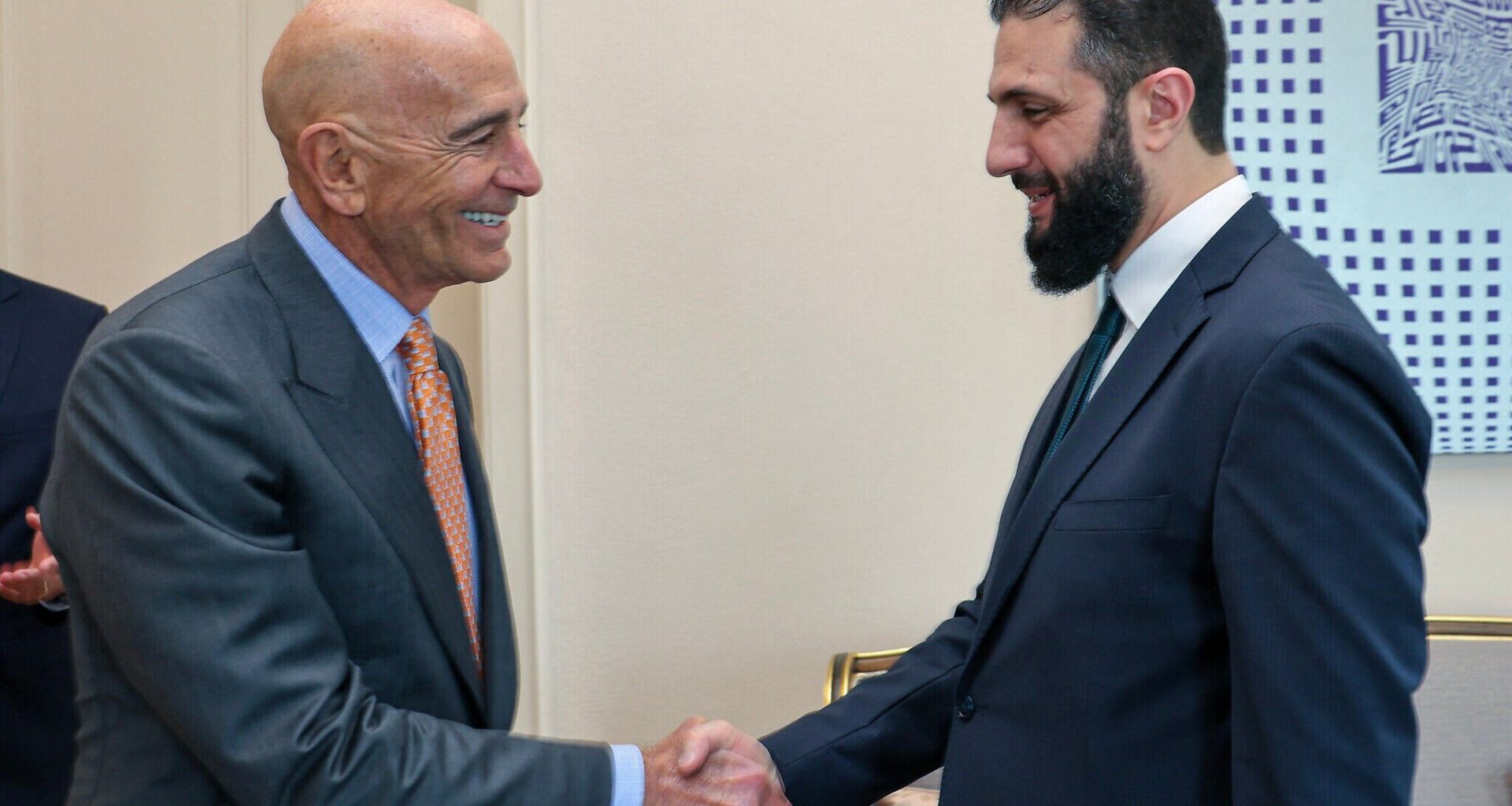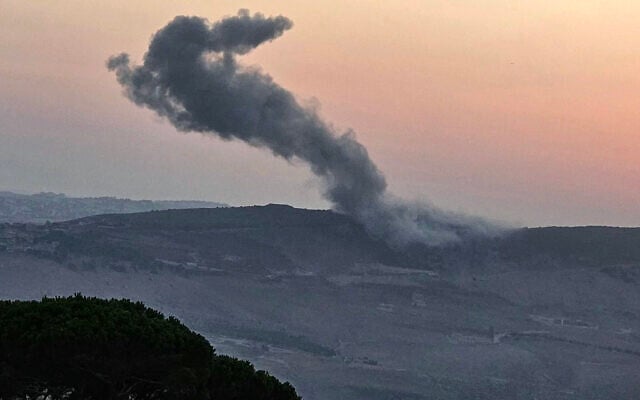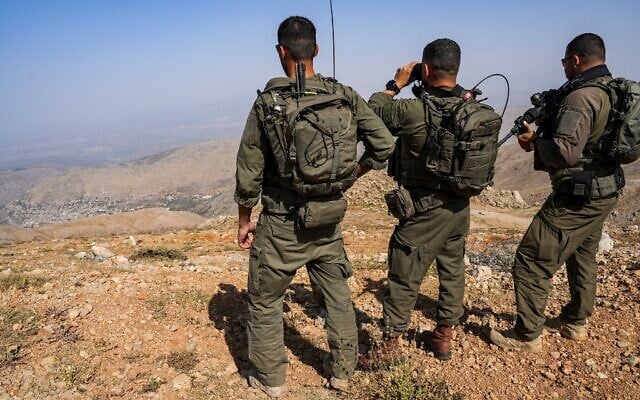US envoy Thomas Barrack arrived in Israel on Sunday and met with Prime Minister Benjamin Netanyahu to discuss Syria and Lebanon, three Israeli officials said, as Jerusalem reportedly closed in on securing understandings with Damascus.
Syria’s President Ahmed al-Sharaa later confirmed to Arab journalists that his government was in “advanced” talks with Israel on a security agreement, according to Sky News Arabic, which quoted him as saying that any deal would be be based on the 1974 disengagement lines that Jerusalem and Damascus agreed to after the Yom Kippur War a year earlier.
Sharaa also reportedly said that while he did not believe the time was right for a peace deal with Israel, he “will not hesitate to take” any agreement that benefits Syria and the region.
Barrack’s meeting with Netanyahu was first reported by Axios, citing three Israeli and US sources, and followed discussions between the US envoy, Strategic Affairs Minister Ron Dermer, and Defense Minister Israel Katz.
US Ambassador to Israel Mike Huckabee also reportedly joined the meetings. The envoys are expected to travel to Lebanon on Monday, with senior Republican Senator Lindsey Graham set to join them in Beirut.
Get The Times of Israel’s Daily Edition
by email and never miss our top stories
By signing up, you agree to the terms
Dermer held talks with Syria’s Foreign Minister Asaad al-Shibani in Paris on Tuesday about security arrangements in southern Syria, two Syrian sources familiar with the meeting said.
Syrian and Israeli officials have been conducting US-mediated talks on de-escalating the conflict in southern Syria. A previous round of talks was held in Paris in late July, but ended without a final accord.
Channel 12 reported Sunday evening on the principles of an emerging security deal that was expected to be signed by Israel and Syria.
A picture taken from the southern Lebanese village of Marjayoun, shows smoke rising from the site of an Israeli airstrike that targeted the outskirts of the village of Kfartibnit in the district of Nabatieh on August 15, 2025. (Rabih DAHER / AFP)
The report said the two sides would agree to the demilitarization of the Syrian side of the Golan Heights, the prevention of the restoration of the Syrian military, the barring of entry of any weapons into Syria that would threaten Israel, and the establishment of a humanitarian corridor to the Jabal al-Druze region of Syria, in exchange of the rehabilitation of Syria — which has been battered by civil war since 2011 — by the US and Gulf countries.
Separately, on Monday, Barrack said in Lebanon that Israel should comply with a plan under which Hezbollah would be disarmed by the end of the year in exchange for a halt to Israel’s military operations in Lebanon.
The plan sets out a phased roadmap for terror groups to hand in their arsenals as Israel’s military halts ground, air, and sea operations, and withdraws troops from Lebanon’s south.
Lebanon’s cabinet approved the plan’s objectives earlier this month despite Hezbollah’s refusal to disarm, and Barrack said it was now Israel’s turn to cooperate.
There was no immediate comment from Netanyahu’s office.
Israel and Syria have technically been at war since 1948. Israel conquered around two-thirds of the Golan Heights from Syria during the Six Day War of June 1967, and annexed the territory in 1981, in a move not recognized by much of the international community, with the exception of the United States.
A year after the Yom Kippur War of October 1973, Israel and Syria reached an agreement on the disengagement line that Damascus is now pushing to restore.
Tensions soared between Jerusalem and Damascus when Israel took over the UN-patrolled buffer zone in Syria shortly after the Bashar al-Assad regime’s overthrow in December and carried out airstrikes on military sites, in what officials said was aimed at creating a demilitarized zone south of Damascus.
Israeli soldiers operate on the Syrian side of Mount Hermon, August 12, 2025. (Ayal Margolin/Flash90)
Israel has said it will not allow hostile forces to establish themselves along the frontier, as Iranian-backed groups did during Assad’s rule. It distrusts Syria’s new government, which is led by former jihadists.
In July, the IDF conducted airstrikes on Syrian government forces to support Syrian Druze — who have close relations with Israel’s Druze community — amid violent clashes with regime-allied forces in the Sweida area of southern Syria.
Separately, Israel and Hezbollah engaged in hostilities for over a year after the Lebanese terror group began firing at Israel, unprovoked, in solidarity with its ally Hamas and its massacre in southern Israel on October 7, 2023.
The rocket fire displaced some 60,000 residents of northern Israel. In a bid to ensure their safe return, Israel stepped up operations in Lebanon in September, leading to two months of open warfare with Hezbollah in which the terror group’s leadership and arsenal were decimated.
Is The Times of Israel important to you?
If so, we have a request.
Every day, even during war, our journalists keep you abreast of the most important developments that merit your attention. Millions of people rely on ToI for fast, fair and free coverage of Israel and the Jewish world.
We care about Israel – and we know you do too. So today, we have an ask: show your appreciation for our work by joining The Times of Israel Community, an exclusive group for readers like you who appreciate and financially support our work.
Already a member? Sign in to stop seeing this
You appreciate our journalism

You clearly find our careful reporting valuable, in a time when facts are often distorted and news coverage often lacks context.
Your support is essential to continue our work. We want to continue delivering the professional journalism you value, even as the demands on our newsroom have grown dramatically since October 7.
So today, please consider joining our reader support group, The Times of Israel Community. For as little as $6 a month you’ll become our partners while enjoying The Times of Israel AD-FREE, as well as accessing exclusive content available only to Times of Israel Community members.
Thank you,
David Horovitz, Founding Editor of The Times of Israel



